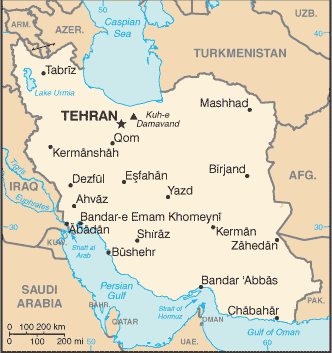The Guardian Council won’t release their official list of approved candidates for next month’s presidential election until later Wednesday, but early leaks says that two high profile candidates, Akbar Hashemi Rafsanjani and Esfandiar Mashaei have both been disqualified.
 The Guardian Council usually whittles down a large list of would-be candidates to a handful. In 2009 nearly 500 applicants boiled down to just four candidates, while in 2005 the list was six. Experts say it would be unusual for the final list to exceed eight candidates this time around, though over 400 have applied.
The Guardian Council usually whittles down a large list of would-be candidates to a handful. In 2009 nearly 500 applicants boiled down to just four candidates, while in 2005 the list was six. Experts say it would be unusual for the final list to exceed eight candidates this time around, though over 400 have applied.
Most of those candidates are dismissed for simply being too obscure to have a chance, or being too similar in position to another higher-profile candidate, an effort to make the first vote and any subsequent run-off votes less messy. At the same time, the council also disqualifies people for religious or philosophical positions that they believe are incompatible with the office.
Rafsanjani, president from 1989 to 1997, was a close follower of Grand Ayatollah Ruhollah Khomeini, the original Supreme Leader of Iran, but is seen as something of a rival by his successor, current Supreme Leader Grand Ayatollah Ali Khamenei. This made his attempt to run for office again unwelcome to many pro-Khamenei officials.
At the same time, Rafsanjani is hugely respected, making it impractical to ban him for philosophical reasons. Instead, his advanced age (nearing his 79th birthday) is the most likely excuse. Previous Iranian election laws specifically barred candidates over the age of 75, and while this one didn’t the Guardian Council has suggested it would disqualify people whose age made them too “feeble” to run.
Mashaei is a much more polarizing figure in Iranian politics, however. A close friend of outgoing President Ahmedinejad, Mashaei served as vice president before being disqualified, and his open talk of “separation of mosque and state” set him up in the role of radical challenger of the status quo. Still, his high profile status makes disqualifying him out of hand unusual, to say the least, and a more thorough explanation is likely to be expected.
With the final list still not public, the obvious front-runner is believed to now be Saeed Jalili, Iran’s top nuclear negotiator and a close ally of Khamenei’s. Iran’s conservative clergy had clearly had enough of the Ahmadinejad era, and was believed to be looking for a more straightforward ally to the supreme leader, and Jalili is likely the most high-profile of the candidates to fit that bill.


